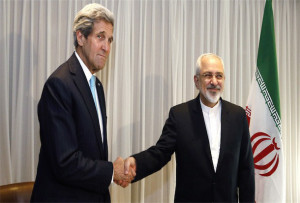
However, hardly had the participants of the negotiation process returned to their capitals, politicians in several countries subjected the agreement to sharp criticism and expressed their disagreement with the position taken by the “Six.” At the state level, this document condemned Israel, the Prime Minister of which, Benjamin Netanyahu, had called it a ‘historic mistake.’ According to him, Iran is not going to abandon its plans to build nuclear weapons, or change its extremely hostile policy towards Israel, or stop supporting radical Palestinian organizations (Hamas, “Hezbollah”) and, therefore, there is no reason to lift the sanctions imposed on Iran, at least for now. He also alleged the deal will only serve to increase the defense capabilities of Iran and will consolidate the country’s leadership in their attempt to revitalize the subversion in the region. A number of US congressional representatives, primarily Republicans who declare their readiness to “torpedo” the agreement in the Senate and House of Representatives, share similar opinion.
However, one of the co-authors of this agreement – Barack Obama, said that the Prime Minister of Israel and his supporters in the United States are mistaken in their assessment of the nuclear deal with Iran. The US administration believes the agreement to be mutually beneficial and sees no alternatives to it, although it recognizes that the agreement does not solve all the problems associated with Iran. A number of experts from among former military and security services of the US, the NATO countries and even Israel share this position. There is an evident split in the government and society of both Israel and the United States on this important issue.
Despite this rhetoric, serious preconditions have already been created for the approval of this agreement by all the countries-partic
There were also opponents of the nuclear deal with Iran among the Arab countries, led by Saudi Arabia and a number of other Persian Gulf monarchies. In Riyadh, Doha, Amman and other Arab capitals, where Sunni clans are in power, they are also skeptical about the peaceful nature of the Iran’s nuclear program and fear that after the lifting of restrictive sanctions against Tehran, the Islamic Republic of Iran will emerge as a strong regional power and will more actively support the Shiite communities in the region. In particular, it is expected that the position of Tehran in Iraq, where the Shiite party already has majority of seats in the government, will strengthen; the Alawite (Shiite) clan of Bashar al-Assad in Syria, the military-politic
In general, the monarchs of the Persian Gulf and a number of other Sunnis Arab leaders fear losing their dominant, gained through many centuries, position in society. They dread the time when they will have to share power, natural resources (hydrocarbons) and income with their Shiite communities, and, as in the case of Bahrain, will have to hand over power to the representatives of the Shiite majority in a democratic election. To pre-empt the development of the situation in the region in this unfavorable for the monarchies direction, Riyadh and its partners in the GCC have been artificially inflating the threat of Iran’s expansion in the region, bringing up the issue of “Shiite crescent” or “Shia arc” here and there. Such a strategy provoked three large-scale armed conflicts (in Syria, Iraq and Yemen), which, basically, transformed into civil wars between Sunnis and Shiites with active external intervention. Jordan, Turkey, Lebanon’s Sunni community and, of course, the Gulf countries have all been pulled into the struggle with Damascus. Arab kings, emirs, sheikhs prefer to play Arabs off against each other over sectarian differences and, to minimize internal conflicts at home, to stir up blood shedding among them on the distant approaches. The memories are still fresh of punitive operations and treacherous massacres of the Shiites of Bahrain and the Eastern Province of KSA during the events of the “Arab Spring” unleashed by Saudi power structures.
Overall, Riyadh and Doha’s exercise a “cynical” policy in the region. While the Persian Gulf monarchs say they condemn the actions of radical Islamists, represented by such terrorist groups, as the Islamic state, “Al-Nusra Jhabgu,” etc., (they even join the international coalition under the auspices of the United States to participate in air strikes against the positions of the Islamists), they continue to actively support the Islamic Caliphate, created by the ISIS militants, which they consider a Sunni stronghold on the border with Iran, through the channels of secret services and various non-governmental organizations and Wahhabi foundations, the Persian Gulf monarchies.
Thus, in the actual prevailing conditions, a total discharge of an explosive situation in the Middle East should not be expected. The deal with Iran is clearly rejected in Jerusalem and Riyadh, and is also questioned in the United States. The Turkish leadership has not rendered a straightforward assessment of this agreement, but Ankara is clearly wary of its regional competitor’s increasing strength and, in particular, enhanced assistance to Bashar al-Assad’s regime in Syria, perceived as hostile by Ankara.
Based on the foregoing, it can be assumed that Iran’s release from its international isolation will not promote peace and security in the Middle East. Most likely, Israel will toughen its stance on the Palestinian issue and will focus on the further militarization of the country. The Israeli lobby in Washington will do everything to neutralize the “side effects” of the deal with Iran. The Gulf monarchies, Jordan and Turkey will also make significant adjustments to their military programs, will accelerate the establishment of a regional missile defense system under the auspices of the United States, the construction of nuclear power plants, will try to hasten the overthrow of the regime of Bashar al-Assad in Syria and will toughen the fight against the forces of the internal (Shiite) opposition.
Stanislav Ivanov, Leading research fellow of IMEMO and the Institute of Oriental Studies, Ph.D., exclusively for the online magazine “New Eastern Outlook.”
